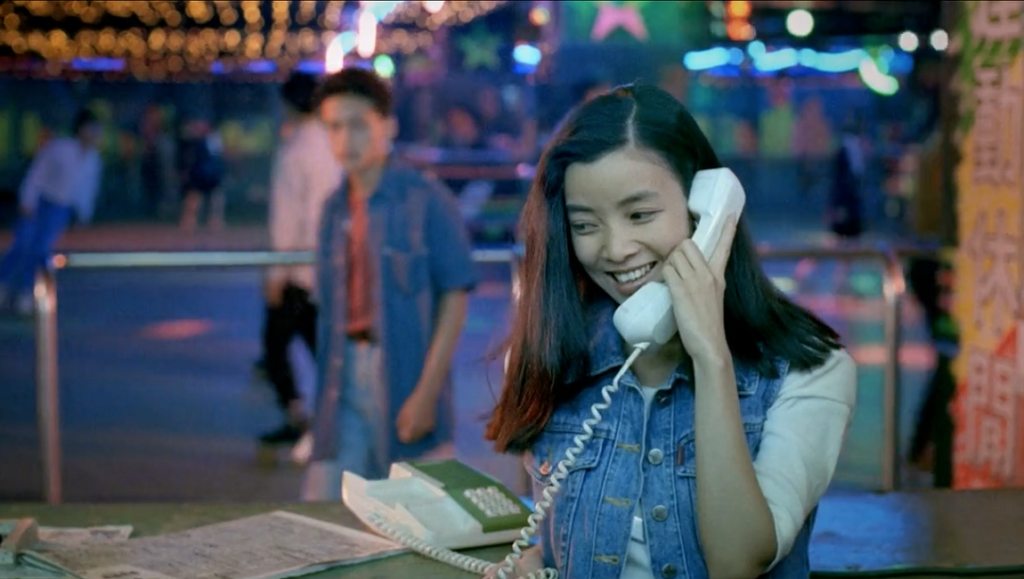Typically regarded as a key director of the Taiwanese Second New Wave, Tsai Ming-liang and his debut theatrical feature Rebels of the Neon God exhibit, at this early moment, an observable relationship in content and visual grammar to that of the 80s New Taiwanese Cinema. The film is told through dual, overlapping narratives that explore the difficulties of making and maintaining connections in modern life: one follows a silent young loner, Hsiao Kang (Lee Kang-sheng), the difficulties he has with his parents, and more importantly the obsession he develops for Ah Tze (Chen Chao-jung, protagonist of the second narrative) that leads him to drop out of cram school so as to stalk the latter (an undeveloped instance in subtext, perhaps, of the queer themes that later come to the fore in Tsai’s). Ah Tze is a motorcyclist and thief who gets by with his friend Ah Ping (Jen Chang-bin) by vandalising telephone boxes for their change and reselling stolen game boards from arcades. Eventually the two meet Ah Kuei, a young woman who the viewer is introduced to after she has a one-night stand with Ah Tze’s brother, and with whom Ah Tze eventually begins a tenuous romantic relationship. Much in the same way as the prior cinematic generation, Tsai’s narrative here unfolds with an emphasis on the minutia and mundanity of everyday life and its locales, and adopts a visual style that utilizes stillness and simple compositions to foreground the interior life of his characters. However, where major figures of the New Cinema like Edward Yang and Hou Hsiao-hsien would opt to navigate their characters’ ennui under the parameters of historical rupture (Hou) or a definite, comprehensible economic order (Yang), Tsai’s divergences from the New Cinema cohort are clear even at this early stage, preferring to explore and inhabit mood and more melancholic affects without clear theme or plot.
Where the New Cinema comprehended this despair in a concrete way, Tsai generalizes it in the context of the specifically 90s ‘end of history’ and dwells within it, offering in response to this palpable disquiet and fractured state of modern life no epiphanies or defined ways forward.
As the film progresses, Tsai’s idiosyncrasies are further articulated in how neither narrative expressly recognizes the other in a proper sense, touching at points, but never becoming the other’s focus — except for in Hsiao Kang who attempts to insinuate himself into Ah Tze’s world, going so far as to destroy Ah Tze’s motorcycle as a pretext for speaking to him (these will be Hsiao Kang’s only words in the film). The action is nearly successful — as a borderline experimental instance of parallel editing makes plain, as Hsiao Kang and Ah Tze achieve a near synchronicity of movement and action across the cut — but comes to naught when Ah Tze rejects Hsiao Kang’s offer of help, and with it the narratives spin apart. Rebels of the Neon God is further notable for the erotic charge it sets as a staple of Tsai’s work in features, suffusing with desire everything from the characters to the look of the streets of Taipei. The attention to place owes again to New Cinema, but is unique here for the aimless kineticism Tsai gifts the outdoor locales — movement offering the chance to flee one’s thoughts — and the more expressively still shooting of interior spaces, as they house and reflect the characters’ inability to understand the world. Where the New Cinema comprehended this despair in a concrete way, Tsai generalizes it in the context of the specifically 90s ‘end of history’ and dwells within it, offering in response to this palpable disquiet and fractured state of modern life no epiphanies or defined ways forward; only two lovers unsure of the world and one another, and a young man who rejects all connections as such. While a bold and assured feature debut, the film too remains suitably curious from an auteurist standpoint for how it so tangibly showcases a director in the midst of his evolution.


Comments are closed.